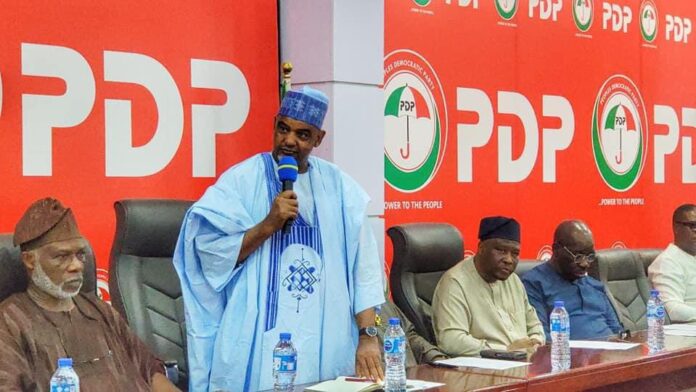The ongoing rift within the Peoples Democratic Party (PDP) has taken another twist as the party’s Disciplinary Committee shed light on why it has not yet summoned high-profile members, including former Vice President Atiku Abubakar and Federal Capital Territory (FCT) Minister Nyesom Wike. Speaking at a press briefing in Abuja, the Committee’s Chairman, High Chief Tom Ikimi, denied claims that the duo was being deliberately sidelined or excluded from any internal investigation.
Ikimi, flanked by committee members such as the Secretary, Chief Eyitayo Jegede, and former Governors Ibrahim Shekarau of Kano and Sam Egwu of Ebonyi, revealed that the committee’s mandate is driven purely by petitions. He made it clear that unless a formal petition is filed against any individual, including Atiku and Wike, the committee will not intervene.
“We are not a proactive body that goes around looking for issues,” Ikimi clarified. “The committee does not write petitions. We respond to petitions that are submitted to us. If there is no petition against someone, we cannot take any action. It is simply not our business to deal with matters based on what is reported in the media or hearsay.”
This statement comes amid speculation and rumors that Atiku and Wike, two of the most influential figures in the party, may have been deliberately left out of disciplinary proceedings over their roles in recent political developments.
Deferral of Hearings
One of the key points addressed by Ikimi was the deferment of the committee’s hearing of various petitions. On Wednesday, the committee had initially planned to hear petitions against several party members, including Senator Samuel Anyanwu, the National Secretary of the PDP, and former Governor Samuel Ortom of Benue State, alongside ten others from the state.
However, due to unavoidable circumstances, the committee decided to push back the hearings by two to three weeks. According to Ikimi, Anyanwu had presented a medical excuse, supported by documentation from his healthcare provider, while Ortom and the other Benue State members claimed they had not received the petitions that had been sent to them. Ikimi emphasized that the committee had confirmed the petitions were delivered but, in the spirit of fairness, chose to defer the hearing until March 4.
“We believe in due process and the right to a fair hearing. While we have evidence that the petitions were sent, we want to ensure that everyone is properly informed and has the opportunity to respond,” Ikimi stated.
Dispute Over Alleged Exclusions
The decision to defer the hearings was influenced by reports, particularly from Ortom and others, claiming they were unaware of any formal proceedings. However, Ikimi stood firm, asserting that the committee had followed the correct procedure in notifying all parties involved.
“Contrary to what has been claimed, the petitions were served properly to those concerned,” Ikimi said. “We received correspondence from both Senator Anyanwu and former Governor Ortom, and we have proof that they got the documents. If there were any communication issues, we are willing to give the benefit of the doubt and allow the necessary time for them to respond.”
This clarification follows growing concerns within the party, particularly after Ortom alleged in an interview that the committee’s process was not transparent. “We were not informed properly,” Ortom claimed last week. “There is a deliberate attempt to sideline us.” However, Ikimi dismissed these allegations as unfounded, pointing out that the committee had adhered to its mandate of reviewing only formal petitions.
Committee’s Mandate and Scope
The statement by Ikimi also highlighted the limited scope of the committee’s actions. The Disciplinary Committee, according to the chairman, only engages in disciplinary proceedings after a written petition is submitted. It does not investigate issues based solely on media reports or public speculation, meaning that without formal complaints or evidence, no disciplinary actions can be initiated.
“The committee’s primary duty is to adjudicate petitions brought before it,” Ikimi emphasized. “If no one petitions against an individual or group, the committee cannot start any proceedings against them.”
This narrow focus aligns with the procedural guidelines of the PDP’s internal conflict resolution system. It also underscores the limits of the committee’s influence in the ongoing struggles within the party, particularly as it relates to high-profile figures like Atiku and Wike.
Atiku and Wike: Key Figures in PDP’s Internal Struggles
Atiku Abubakar and Nyesom Wike are two of the most influential leaders within the PDP. Atiku, who ran as the PDP’s presidential candidate in the 2023 elections, is seen as a key figure in the party’s establishment. Wike, on the other hand, has played a pivotal role in the party’s recent maneuverings, particularly in securing the party’s control of key states.
However, both have been embroiled in controversy within the PDP. Atiku’s leadership style and his relationship with other factions in the party have come under scrutiny, while Wike has been at the center of several intra-party conflicts. Despite their prominence, the disciplinary committee has not received any formal complaints against them, which is why they have not been summoned to appear before the committee, as Ikimi explained.
“The committee does not get involved in internal politics. If there is a petition against someone, we will deal with it. But until that happens, we have no reason to take action,” Ikimi concluded.
What Lies Ahead for PDP’s Disciplinary Process?
As the PDP continues to navigate its internal conflicts, the role of the Disciplinary Committee becomes even more critical. With the postponement of the hearings and no new petitions yet filed against Atiku or Wike, the party faces a delicate balancing act. The committee’s actions, or inaction, will undoubtedly influence the party’s ability to maintain unity and discipline in the run-up to future elections.
Party insiders remain divided on how the committee will handle potential disputes in the future. Will it maintain its strict adherence to procedural guidelines, or will it become more proactive in resolving the tensions between party heavyweights.

